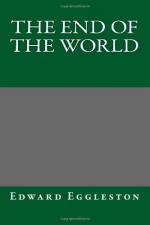“Why don’t you come when you’re called, I’d like to know! You’re never in reach when you’re wanted, and you’re good for nothing when you are here!”
Julia Anderson’s earliest lesson from her mother’s lips had been that she was good for nothing. And every day and almost every hour since had brought her repeated assurances that she was good for nothing. If she had not been good for a great deal, she would long since have been good for nothing as the result of such teaching. But though this was not the first, nor the thousandth, nor the ten thousandth time that she had been told that she was good for nothing, the accustomed insult seemed to sting her now more than ever. Was it that, being almost eighteen, she was beginning to feel the woman blossoming in her nature? Or, was it that the tender words of August Wehle had made her sure that she was good for something, that now her heart felt her mother’s insult to be a stale, selfish, ill-natured lie?
“Take this cup of tea over to Mrs. Malcolm’s, and tell her that it a’n’t quite as good as what I borried of her last week. And tell her that they’ll be a new-fangled preacher at the school-house a Sunday, a Millerite or somethin’, a preachin’ about the end of the world.”
Julia did not say “Yes, ma’am,” in her usually meek style. She smarted a little yet from the harsh words, and so went away in silence.
Why did she walk fast? Had she noticed that August Wehle, who was “breaking up” her father’s north field, was just plowing down the west side of his land? If she hastened, she might reach the cross-fence as he came round to it, and while he was yet hidden from the sight of the house by the turn of the hill. And would not a few words from August Wehle be pleasant to her ears after her mother’s sharp depreciation? It is at least safe to conjecture that some such feeling made her hurry through the long, waving timothy of the meadow, and made her cross the log that spanned the brook without ever so much as stopping to look at the minnows glancing about in the water flecked with the sunlight that struggled through the boughs of the water-willows. For, in her thorough loneliness, Julia Anderson had come to love the birds, the squirrels, and the fishes as companions, and in all her life she had never before crossed the meadow brook without stooping to look at the minnows.
All this haste Mrs. Anderson noticed. Having often scolded
[Illustration: Taking an observation.]
Julia for “talking to the fishes like a fool,” she noticed the omission. And now she only waited until Julia was over the hill to take the path round the fence under shelter of the blackberry thicket until she came to the clump of alders, from the midst of which she could plainly see if any conversation should take place between her Julia and the comely young Dutchman.




